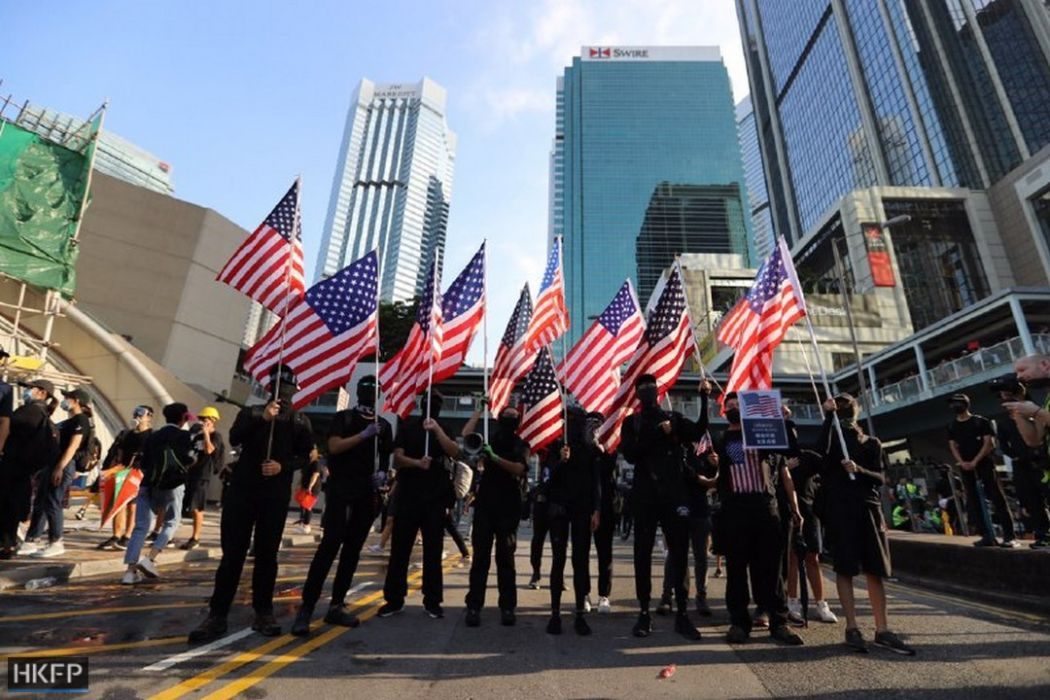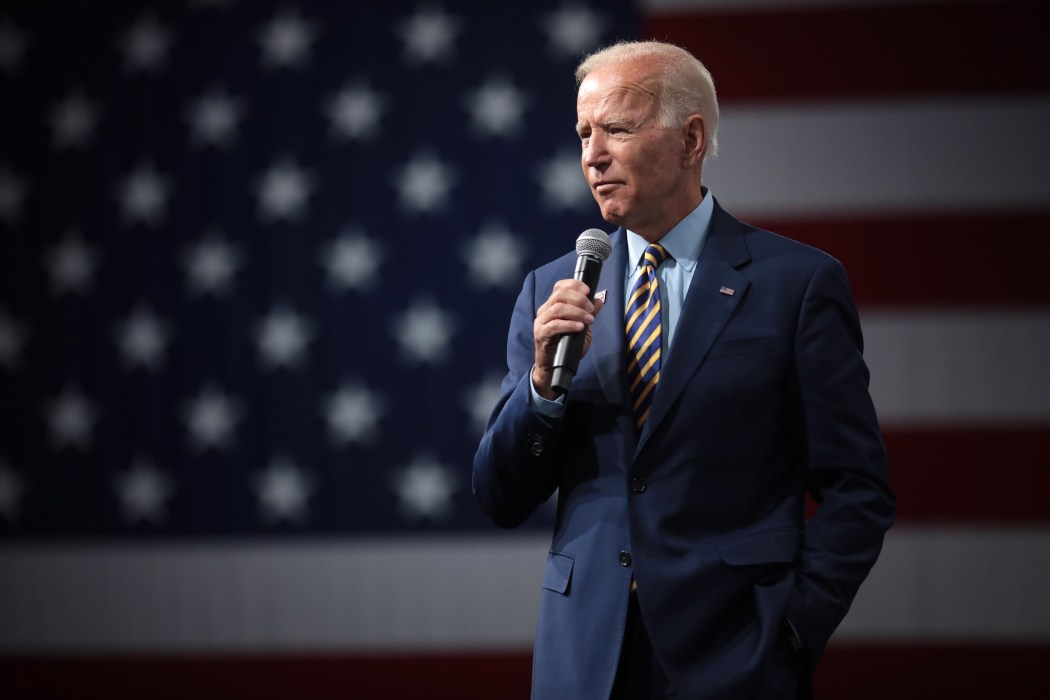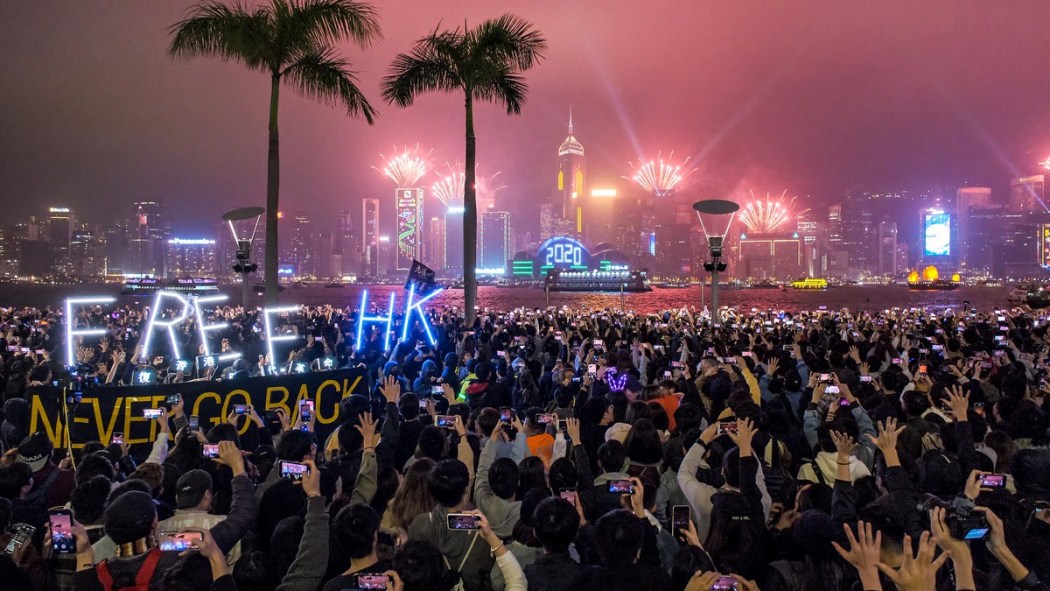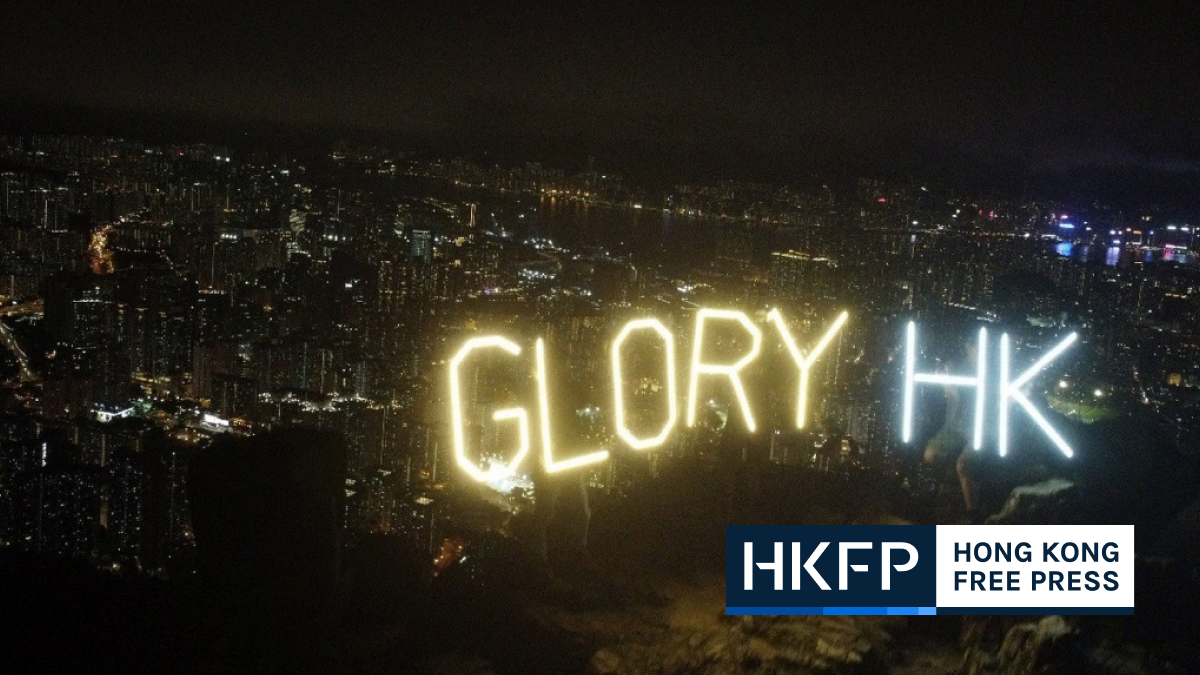By Sebastian Skov Andersen and Joyce Leung
Next month’s US presidential election will be among the most closely watched in Hong Kong’s history. While Donald Trump is currently trailing in opinion polls, some pro-democracy supporters believe that only his re-election will guarantee the city’s continued existence as an entity distinct from mainland China.
At many protests last year Hongkongers were seen flying the Stars and Stripes, especially when Trump had expressed support for the demonstrators in one way or another, and the country’s values have enduring appeal.

The debate around Trump has heated up in the lead-up to the elections, especially on social media where his presidency has been a polarising force. In one Twitter post, an American Hongkonger known as “Nikki” expressed her support for Trump by sharing photos of “Hongkongers for Trump” signs. She ignited a strong-worded debate.
Many who oppose Trump were offended that she would speak on behalf of the Hong Kong people, and said they did not want the pro-democracy movement associated with the president. Others came to her defence, saying Trump’s efforts to stand up to China were deserving of support.
“Trump is our hope to defeat CCP (the Chinese Communist Party) so as to have our beloved HK restored,” one person replied to Nikki’s tweet.
Another Twitter-user shared that sentiment, arguing that “people who are upset that Nikki supports Trump needs to remember that Trump is Anti Communist. No, he is not perfect and he says crazy shit something. But he & his team gets shit done.”
But not everyone was appreciative.
“Promoted #FreeHongKong and a #fascist, #sociopathic #IdiotinChief in the same signage. Come on, #HongKongProtesters should be better than this. [Trump] is not America,” one person wrote.
‘Beacon of hope’
Trump’s tough stance on China and support for the pro-democracy movement has fuelled hope in some Hongkongers, faced with a sometimes indifferent international society. They say his administration is the only government that has truly opened its eyes to the threat that China poses to the free world.
In November last year, Trump signed into law the Human Rights and Democracy Act which mandates an annual review to ensure Hong Kong retains enough autonomy to justify its special status with the US. Half a year later, in response to Beijing’s imposition of the national security law, Trump removed the city’s special status, in an economic and diplomatic blow to China.
The president was also quick to refer to Covid-19 as the “China virus,” to the great satisfaction of many Hongkongers who wanted to hold China responsible for its handling of the initial outbreak.

The latest example of Trump’s hardline stance is his war against TikTok, the Chinese-owned social media platform.
“After the 2019 anti-extradition bill movement, I realized that the United States’ traditional way of handling China has not stopped China from growing powerful,” said Joshua Tang [not his real name], a translator in his late 20s. “Instead it enabled the Chinese Communist Party (CCP) to become even stronger and more expansionist.”
But the level of enthusiasm for Trump varies in Hong Kong. Some support him wholeheartedly, others consider him a last resort because the rest of the world’s inaction has left Hong Kong vulnerable.
“Desperate times, desperate measures,” said Daryl Sze To, a 25-year-old banker. “We don’t have a choice. If Joe Biden becomes president, Hong Kong will suffer so badly, so we kind of don’t have a choice.”

“I am looking at this as a Hongkonger, and I believe in Trump,” he said. “He is tough on China and he is willing to sacrifice some of the United States’ interests to ensure Hong Kong’s autonomy. I don’t think he cares about democracy and freedom in Hong Kong, but helping Hong Kong aligns with his interests.”
It is unclear just how popular Trump is with pan-democrats, but a poll that surveyed Hongkongers with all political affiliations for Newsweek magazine found in July that 36 per cent of Hongkongers rooted for Trump’s re-election, and 33 per cent supported Joe Biden. The rest were don’t knows.
Trump has won over some prominent pro-democracy figures. In an interview with HKFP, Apple Daily owner Jimmy Lai said he would support him in the upcoming election.
I think Trump knows how to deal with China. He plays hardball and he is a man of his word, and he is really powerful in the way he deals with dictators. He [makes] deals, by instinct, he knows how to deal with it,” Lai said.
“People here know that if Trump gets elected, we will have greater support. That’s the impression, whether it’s going to be true or not. I share the same impression.”

Apple Daily, the newspaper Lai owns and runs, is widely seen as a pillar of press freedom in the city, yet President Trump has repeatedly delegitimized the White House press corps by dismissing its reporting as “fake news,” and Trump’s anti-media rhetoric has contributed to a widespread erosion of trust in journalism in the United States.
Trump has a history of celebrating violence against journalists, and has been accused of inciting it, too. In 2018, he dubbed the media the “true enemy of the people” on the same day that a bomb was sent to CNN’s Atlanta offices.
To this, Lai’s right-hand man Mark Simon – emphasising that Trump was by no means his first choice for President – referred to the conditions for journalists elsewhere in the world, such as in the Philippines, Russia or Myanmar, where they often face death threats and persecution.
According to Simon, despite Trump’s openly anti-media stance, the overall state of press freedom in America remains largely unaffected, especially from a legislative standpoint, he said. “Has Trump done anything other than run his mouth about the media? What’s he gonna do? What could he possibly do?” Simon asked.

Simon told HKFP that his primary concern was not Trump’s policies domestically, but how they affected Hong Kong’s pro-democracy movement.
But critics have pointed out that press freedom is just one out of many conflicts of interest between the pro-democracy movement and the Trump administration.
Biden 2020?
Not everyone agrees. Eric Fok, a freelance journalist who supports the pro-democracy movement, says Trump represents the opposite of what Hongkongers have fought for.
“How can the movement justify itself when it condemns the Hong Kong police’s physical attacks on the free press while supporting a US president that called a reporter being hit by anti-riot munitions ‘a beautiful sight,’” Fok told HKFP.

According to Rosemary Foot, Professor of International Relations at Oxford University, the policies that the pro-democracy movement supports align more naturally with the Biden campaign. There is also not necessarily any reason to believe that Biden’s election would make much difference for Hongkongers, she said.
“I don’t know the current sentiments of the pro-democracy movement with regard to the two US presidential candidates, but they should align with Joe Biden,” she said. “Trump himself is no friend of those concerned about the protection of democracy and human rights.”
In her view, China will remain a major issue of concern to a potential Biden administration. There is strong bipartisan consensus in Congress on the need to respond to the negative aspects of a resurgent Chinese republic, she said.

“Biden will not be weak on China,” she told HKFP. “China will continue to be seen as a serious rival and a competitor. The main difference will be a search for areas of potential cooperation with China on ‘shared fate’ issues such as climate change.”
Fok said the support for Trump among some pro-democracy Hongkongers made him question the political integrity of that segment of opinion.
“It begs the question, are you supporting Trump’s stance on China or are you just supporting Trump? If it’s just the policy, then should one not actively look for alternatives? If it’s Trumpian politics, then why is it okay to abandon the ideals that this movement was based upon?” he said.
Guardian of freedom?
Even though the American election is still set to proceed, Trump and other officials from the Republican party have worked hard to ensure that certain groups of voters will not get their say in the election. In fact, parts of the Trump campaign’s election strategy comes down to voter suppression, largely because the Republican party has historically benefited from low voter turnout – something Trump himself has openly admitted.

“I think it’s common sense among intellectuals globally that Trump is not a guardian of freedom of speech, democracy or freedom generally. He definitely does not care about principles, and that obviously projects a very different image from what we believe in the Hong Kong protests,” the exiled Chinese political cartoonist and human rights activist, Badiucao, told HKFP.
Badiucao has been outspoken in his dissatisfaction with Trump’s recent rise in support among Hongkongers.
He sees the support mainly as a symptom of desperation – “Desperate people will grasp at a straw, even if it turns out to be a snake, and soon they’ll be blind” – but said ignorance of overseas affairs also played a role.
Tang, however, pointed out that Trump operates in a democratic system and was elected through democratic processes – he has every right to challenge the election and to criticize the press – whereas Hong Kong’s government operates in an authoritarian setting.

“There are no conflicts with the pro-democracy movement,” said Tang. “He is universally elected as president under the US constitution. I don’t think the media silenced themselves after he vocally attacked them and, under the First Amendment, they can still say whatever they want. I don’t think you can do that under the national security law.”
Support HKFP | Policies & Ethics | Error/typo? | Contact Us | Newsletter | Transparency & Annual Report | Apps
Help safeguard press freedom & keep HKFP free for all readers by supporting our team
























